Seven best teas for headaches and stress
A headache is not just discomfort, it is disabling. It ruins your entire day. Did you know over 50% of the adult population in the world suffer from headaches? (1) It can be a tension headache, cluster headache, migraine, caffeine headache, exertion headache, sinus headache, hormone headache, hypertension headache, rebound headache, or a post-traumatic headache. While tension headaches cause mild and moderate pain, migraine causes severe pain.
What do you do when you have a headache? Go for a painkiller? From experience, you might know that a headache doesn’t leave you easy. It comes back eventually as the medicine leaves the system. Therefore, taking a painkiller every time you have a headache is not the solution. If you are looking for a permanent solution and don't want to go for over the counter medication, perhaps tea can be the potion you are looking for!
Contents
Medicinal properties of tea
For thousands of years, tea has been used for different medicinal purposes. The herbs in the tea have loads of medicinal properties which make it an all-natural remedy to cure headaches. A study in 2016 showed that tea has a great ability to soothe tense, nervous headaches. It also revealed that the caffeine present in tea can relieve you from aches and pains instantly just like a painkiller would do (2).
There are many types of teas - Green tea, White tea, Black Tea, Oolong tea and herbal teas. While some are caffeinated which help in aiding migraines, others are decaffeinated. In this article, let us discuss 7 different teas that help you relieve headaches.
One: Ginger tea
Ginger is one of the popular natural ingredients that is being used to combat nausea and headache for centuries. It has anti-inflammatory properties that help you in reducing inflammation caused pain and decreasing tension, thus diminishing the feeling of throbbing and pounding headaches. They work the same way an over the counter pain killer would do. Ginger is also rich in antioxidants that help in eliminating free radicals and toxins which are responsible for recursive headaches (3).
A study showed that ginger can be more effective than sumatriptan (a common prescription pill for migraine pain) in treating migraines. This study was tested on 100 patients with acute migraines. Results showed significantly fewer migraine symptoms only just after two hours of ginger consumption (4).
Ginger tea is made from the ginger root and isn’t actually a tea. You can make your own tea by adding ginger to the water but it needs to be simmered for a pretty long time. If you don’t have that much time, you can directly buy the tea from the market. But make sure you purchase the one that contains natural ginger and not artificial flavourings.
Our recommendation:
Two Seasons is a pure Ceylon black tea that contains a delicate flavour infusion of ginger which adds the subtle spiciness to the flavour of the tea. Ginger in Two Seasons helps in reducing the symptoms of headache pain and combat nausea.
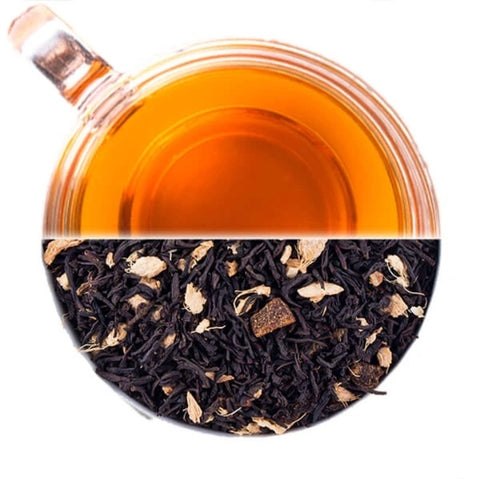
Two: Peppermint tea
Peppermint is best known to combat nausea and aid digestion which can be helpful during headaches and migraines. It also helps in soothing an upset stomach. A study in Germany found that peppermint oil is as effective as paracetamol (a commonly prescribed pain reliever for headaches) in treating tension headaches (5). Another research showed that peppermint helps in decreasing inflammation and treating headache pain by boasting active ingredients including phenols and flavonoids (6).
Peppermint can also be added to other teas and brewed. If you would like to buy peppermint tea in the market, make sure it contains original peppermint, not just artificial flavourings. Peppermint tea also has fewer side effects than its oil, so drinking it will definitely help you in reducing pain and discomfort without any kind of harmful effects.
Our recommendation:
Zen Mint tea is enriched with mint leaves which are harvested in the steep mountains of Kandy district. Mint leaves calm the headache by combating nausea, aiding digestion and soothing upset stomach.
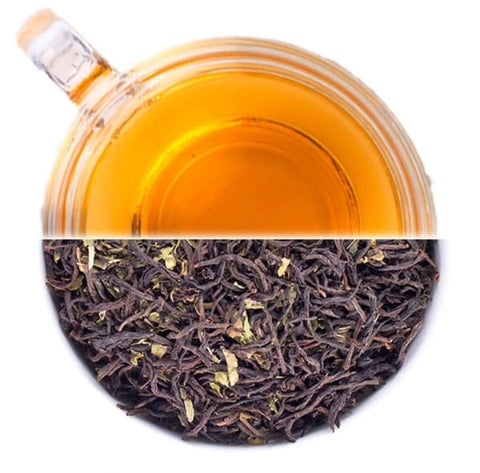
Three: Clove tea
Cloves are the best source for fighting pain. Due to its cooling and pain-relieving properties, we can use cloves for throbbing headaches. It also helps in relieving migraines. In fact, the studies too proved that cloves work the same way the benzocaine in oral procedures do (7).
Cloves also work great in decreasing inflammation and improving blood circulation. So, there are chances drinking clove tea may interact with certain blood thinner medications. If you make any medications, check with your doctor before having clove tea.
You can make clove tea by just steeping them in water for a few minutes. Or else add them to other teas and brew.
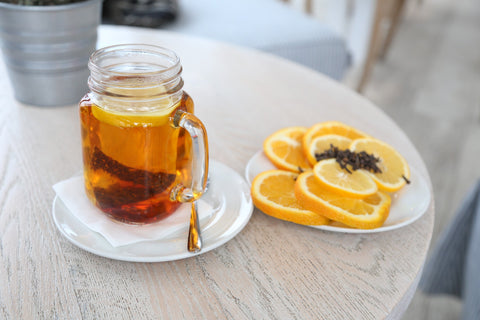
Four: Chamomile tea
Chamomile tea is often considered as a powerhouse for its calming and soothing properties. Resting and having good sleep is the best thing we can do to reduce the pain during headaches and migraines, agree? Chamomile tea helps us in giving the sleep we want by increasing the time spent in deep sleep cycles. Since it has a natural sedative effect, it reduces inflammation and increases relaxation too (8).
A study that examined the effects of chamomile oil (or tea) on migraine without aura showed that its typical application can help reduce the symptoms of pain, photosensitivity, and nausea after just 30 minutes (8).
Since Chamomile tea is made from the Chamomile flowers, people with ragweed allergy may have trouble with chamomile. So, it is better to try it out before using it as a remedy for the headaches.
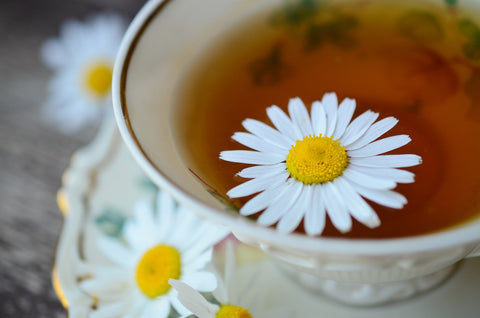
Five: Green tea
Green tea is best known for its health benefits. It has a wide range of recognition in the weight loss industry due to its compounds that help in accelerating fat burning. Green tea is also considered as a popular detox tea thanks to its highly concentrated levels of antioxidants. Not to mention it treats migraine symptoms too by boosting your overall health.
A systematic review of green tea showed that it helps in improving mood and increasing alertness. These symptoms help improve headache symptoms (9). But note that these results may vary from person to person as green tea contains caffeine. So, if you are someone who can have triggered headaches due to caffeine, it is better you stick to herbal tea.
Our recommendation:
Green Valley is a pure Ceylon green tea with a rich and strong in flavour. It offers you a sensational tasting experience. Green Valley is great for alleviating migraines and headaches and improving your mood and alertness.
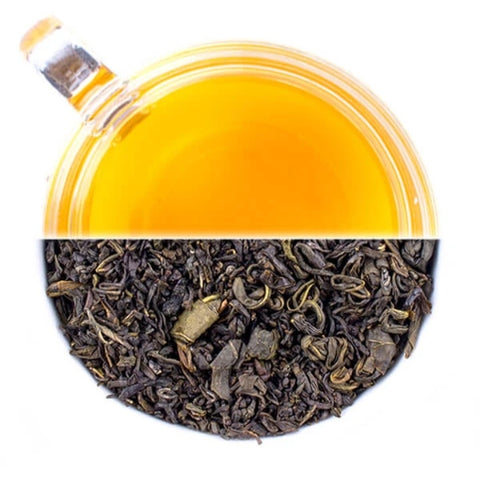
Six: Feverfew tea
Feverfew leaves have long been used in traditional medicine to treat aches and pains. Feverfew tea is best known for its ability to treat the onset of migraine headaches. A review on feverfew showed that it helps in alleviating pain associated with headaches, stomach aches, and arthritis. In the review, there were dozens of studies that found the efficacy of feverfew in preventing and treating onset migraines. It also showed that the tea works on a chemical level to inhibit the release of serotonin and other compounds that are responsible for triggering headaches (10).
The feverfew tea boasts a strong flavour that can be considered as bitter by many people. If you are one of them, try to drink it by blending it with other herbs like lemongrass or adding milk and honey to balance the flavour. Also, note that consuming large amounts of feverfew leaves can cause oral irritation. So, to minimize the side effects, it is better to stick to one cup of tea once in a while.
Seven: Willow Bark tea
Did you know willow bark is called “nature’s Aspirin” for headaches? It is an effective pain remedy for chronic headaches and migraine headaches. The compounds in Willow Bark help in lowering the blood pressure in the small capillaries and blood vessels in the head which in turn results in easing pressure and relieving those painful, debilitating symptoms.
A study showed that this bark which has been used since ancient times to heal pain can also relieve lower back pain and may aid in osteoarthritis pain as well (11). Since Willow Bark is as powerful as Aspirin, experts recommend not to mix it with the over the counter medications. It is also recommended not to drink this tea if you are taking medications for blood sugar disorders and blood thinners.
Other caffeinated teas
If you want relief from a headache fast, caffeine can help. Caffeine is also used in a lot of pain relievers since it can make the pain killers 40% more effective. Did you know sometimes you can stop the pain in its tracks just by taking caffeine alone? It helps in reducing inflammation which in turn can bring you relief. Even the hypnic headaches ( a very rare condition) responds very well to caffeine. Caffeine also helps in giving a boost to common headache remedies. Therefore if you combine caffeine with the over the counter medications like aspirin etc.. they work faster, better and keep the pain away for longer periods. True teas like black tea, green tea, oolong tea, white tea etc.. contain caffeine in them.
Most of the teas discussed above are caffeine-free or herbal teas. They do not contain caffeine. As discussed above, green tea contains a mild amount of caffeine. But, when compared to other true teas like black and white teas, green tea contains way fewer amounts of caffeine. Still, if you are sensitive to caffeine, chances are that it may cause some side effects. These side effects differ from person to person. As some may find taking a little caffeine helps in easing headache while it may trigger the pain for others.
So if you think caffeine can worsen your headache, just stick to one of the herbal teas mentioned in the list. Since they are naturally decaffeinated, they can help you in relieving headaches without triggering any new kind of symptoms like upset stomach, nausea, etc… which can be caused by drinking caffeinated teas.
It is always important to drink enough water and stay hydrated when you have frequent headaches and migraines. So, the next time you feel like a minor headache or a migraine is coming one, reach out for a hot cup of tea. This tasty cuppa helps you in decreasing inflammation and increasing relaxation. It helps you in calming down and soothing the headache pain.
So, choose an effervescent, strong and tingling peppermint tea or go for a calming, soothing and floral with chamomile tea. Make your own tea by steeping fresh cloves or add three feverfew leaves in boiling water. Whatever tea you drink, I am pretty sure you will feel better fast and fall in love with the flavour.
Also make sure you avoid all the headache triggers like stress, alcohol, etc.. Stay away from the bright lights and smells which may trigger migraines.
References
- The role of Caffeine in pain management: A brief literature review — https://www.ncbi.nlm.nih.gov/pubmed/27642573
- Anti-oxidative and anti-inflammatory effects of Ginger in health and physical activity: Review of current evidence — https://www.ncbi.nlm.nih.gov/pmc/articles/PMC3665023/
- Comparison between the efficacy of ginger and sumatriptan in the ablative treatment of the common migraine — https://www.ncbi.nlm.nih.gov/pubmed/23657930
- Effectiveness of Oleum Menthae Piperitae and Paracetamol in the therapy of headache of the tension-type — https://www.ncbi.nlm.nih.gov/pubmed/8805113
- A review of the bioactivity and potential health benefits of peppermint tea (Mentha piperita L.) — https://www.ncbi.nlm.nih.gov/pubmed/16767798
- The effect of clove and benzocaine versus placebo as topical anesthetics — https://www.ncbi.nlm.nih.gov/pubmed/16530911
- Chamomile: A herbal medicine of the past with bright future — https://www.ncbi.nlm.nih.gov/pmc/articles/PMC2995283/
- Evaluation of the effect of topical chamomile (Matricaria chamomilla L.) Oleogel as pain relief in migraine without aura: a randomized, double-blind, placebo-controlled, crossover study — https://www.ncbi.nlm.nih.gov/pubmed/29808331
- Caffeine in the management of patients with a headache — https://www.ncbi.nlm.nih.gov/pmc/articles/PMC5655397/
- Feverfew (Tanacetum parthenium L.): A systematic review — https://www.ncbi.nlm.nih.gov/pmc/articles/PMC3210009/
- A systematic review of the effectiveness of willow bark for musculoskeletal pain — https://www.ncbi.nlm.nih.gov/pubmed/19140170
About the author






0 comments